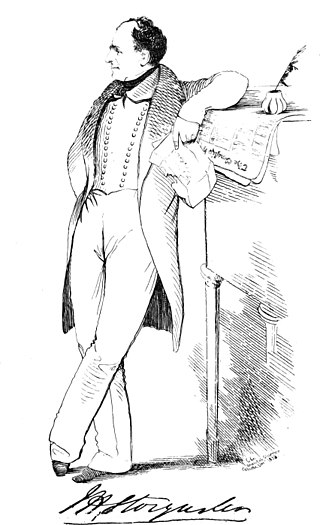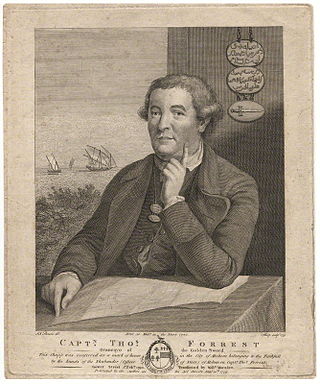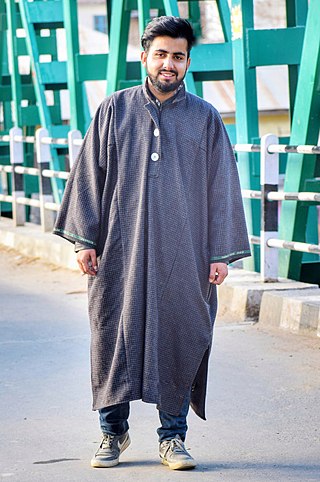Related Research Articles

The Great Game was a rivalry between the 19th-century British and Russian Empires over influence in Asia, primarily in Afghanistan, Persia, and later Tibet. The two colonial empires used military interventions and diplomatic negotiations to acquire and redefine territories in Central and South Asia. Russia conquered Turkestan, and Britain expanded and set the borders of British colonial India. By the early 20th century, a line of independent states, tribes, and monarchies from the shore of the Caspian Sea to the Eastern Himalayas were made into protectorates and territories of the two empires.

Captain Sir Alexander Burnes was a Scottish explorer, military officer, and diplomat associated with the Great Game. He was nicknamed Bokhara Burnes for his role in establishing contact with and exploring Bukhara. His memoir, Travels into Bokhara, was a bestseller when it was first published in 1835.

John Shore, 1st Baron Teignmouth was a British official of the East India Company who served as Governor-General of Bengal from 1793 to 1798. In 1798 he was created Baron Teignmouth in the Peerage of Ireland. Shore was the first president of the British and Foreign Bible Society. A close friend of the orientalist Sir William Jones (1746–1794), Shore edited a memoir of Jones's life in 1804, containing many of Jones's letters.

General Sir William Stephen Alexander Lockhart was a British General in the British Indian Army.

James Baillie Fraser was a Scottish travel writer, and artist who illustrated and wrote about Asia Minor and India. Some of his watercolours made in the picturesque style represent early views of India and Persia.

J. H. Stocqueler was a journalist, author and lecturer with interests in the theatre and in Indian and military affairs; he lived in England, India, and the United States of America.

Anthony Jenkinson was born at Market Harborough, Leicestershire. He was one of the first Englishmen to explore Muscovy and present-day Russia. Jenkinson was a traveller and explorer on behalf of the Muscovy Company and the English crown. He also met Ivan the Terrible several times during his trips to Moscow and Russia. He detailed the accounts of his travel through several written works over his life.

Godfrey Thomas Vigne was an English amateur cricketer and traveller.
There was once a small but important community of Armenians in Afghanistan, centered in Kabul. They lived peacefully among the Muslims, celebrated Nawroz together with them, and were even given the privilege to brew and drink wine.
Thomas Adams, British Army major, posthumously promoted to Brigadier-general based on accounts of his defence of the British position in Bengal in 1763.

James Atkinson was a surgeon, artist and Persian scholar — "a Renaissance man among Anglo-Indians".
Thomas Alcock was an English traveller and adventurer and an agent or servant of the Muscovy Company from 1558 to 1563. According to one of his letters, preserved by Hakluyt, in 1558 he took his first journey overland from Moscow to Smolensk in Russia, and then through Poland towards Danzig. He was, however, prevented from proceeding further than Tirwill, where he was imprisoned in irons for thirty-six days, probably at the instigation of rival traders and ambassadors from Danzig, Lübeck, and Hamburg, who, moreover, prevailed upon the king of Poland to stop all traffic through his dominions of the English trading to Muscovy. There is no further evidence as to the termination of this journey; but in all probability Alcock was allowed to depart for England by way of warning, with the loss of all the money and goods entrusted to him by the company.
Sir Mark Wood, 1st Baronet was a British army officer and engineer. He was a Member of Parliament (MP) for Milborne Port, Gatton and Newark. He received a baronetcy on 3 October 1808.
Donald Campbell, of Barbreck, Argyll, was a Scottish traveller in India and the Middle East.

Arthur Conolly was a British intelligence officer, explorer and writer. He was a captain of the 6th Bengal Light Cavalry in the service of the British East India Company. He participated in many reconnaissance missions into Central Asia and coined the term The Great Game to describe the struggle between the British Empire and the Russian Empire for domination over Central Asia.
William Francklin (1763–1839) was an English orientalist and army officer.

Thomas Forrest was a Scottish navigator who worked for the British East India Company.

Henry Thoby Prinsep was an English official of the Indian Civil Service, and historian of India. In later life he entered politics, and was a significant figure of the cultural circles of London.

Pheran or Phiran is the traditional outfit for both males and females in Kashmir.

Azerbaijan-India relations are the bilateral relations that exist between the Republic of Azerbaijan and the Republic of India.
References
- . Dictionary of National Biography . London: Smith, Elder & Co. 1885–1900.
- Attribution
![]() This article incorporates text from a publication now in the public domain : "Forster, George". Dictionary of National Biography . London: Smith, Elder & Co. 1885–1900.
This article incorporates text from a publication now in the public domain : "Forster, George". Dictionary of National Biography . London: Smith, Elder & Co. 1885–1900.